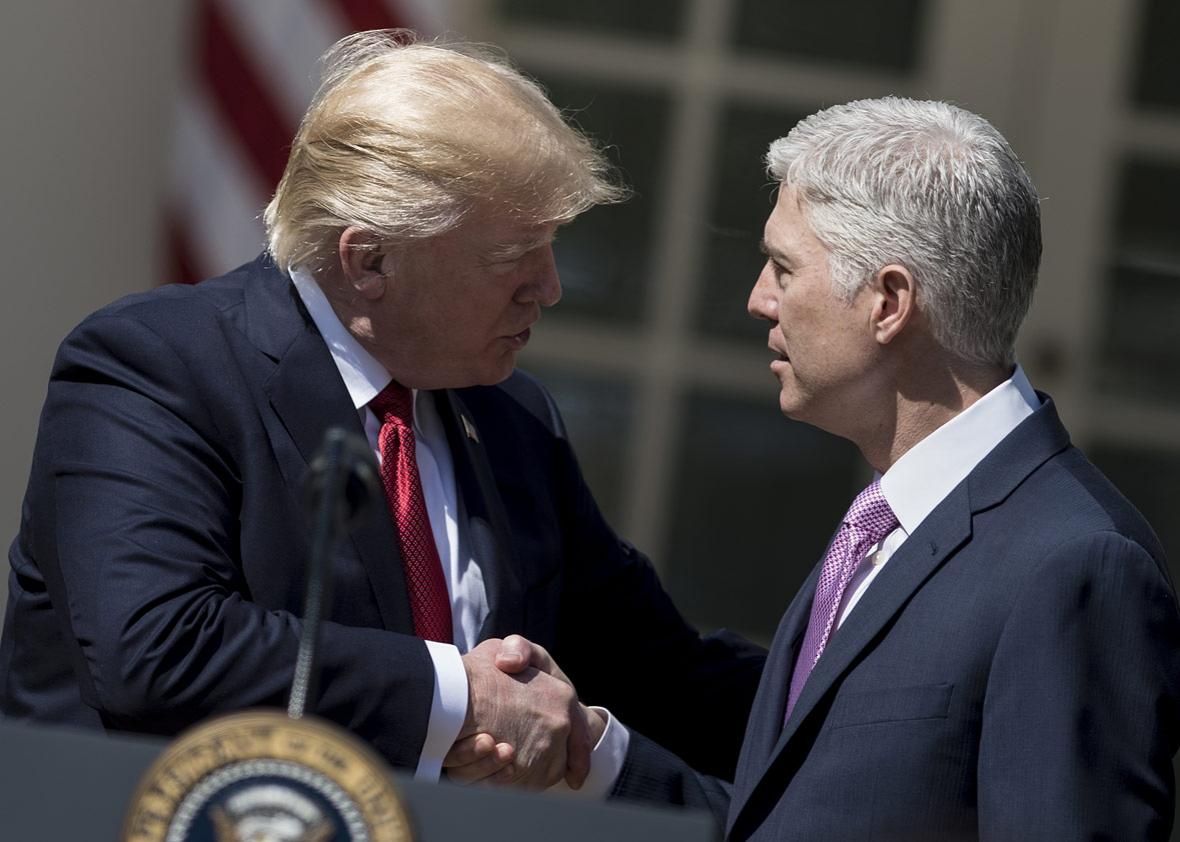Several hours after the New York Times reported on Tuesday that President Donald Trump had attempted to quash the FBI’s investigation into Michael Flynn, conservative pundit Erick Erickson tweeted that “Neil Gorsuch increasingly looks like the high water mark of the Trump era.” Erickson, who had corroborated the previous Trump scandal involving the president’s leak of highly classified information to Russia, echoed the growing consensus that Trump is in a downward spiral, hurtling toward impeachment or, at a minimum, enduring disgrace. But for Erickson and other conservatives, the appointment of Gorsuch to the Supreme Court remains a signal achievement.
Gorsuch’s ascension to the high court may well be Trump’s most influential act as president. Given the lengthy tenure of most modern justices, Gorsuch could still be pulling the Supreme Court to the right in 2045. But this week’s revelations are just the latest reminder that Gorsuch will never be quite like any other justice. He will always be Trump’s justice, a symbol of his disastrous (and possibly brief) presidency, forever stained by the egregious corruption of the man who nominated him. Gorsuch will be around for decades, helping to shape American law. But no matter how long he stays on the bench, his legacy—and his court itself—will be permanently tainted by Trump’s turpitude.
No matter what happened during Trump’s presidency, Gorsuch was destined to go down in history with an asterisk next to his name. The justice assumed a seat Republicans stole from President Barack Obama by refusing to hold hearings, let alone a vote, for Merrick Garland. This unprecedented blockade was an appalling political heist, diminishing the court’s independence in an effort to preserve its conservatism. Anyone who agreed to take this stolen seat was bound to be viewed as illegitimate by a broad swath of the country.
Even so, Gorsuch would be viewed differently if Ted Cruz or Marco Rubio had nominated him. Instead, he was chosen by Trump, the man who admitted to criminal sexual assault on tape, who railed against the “so-called judge” who ruled against him, and who joked about the assassination of his political opponent. In the face of this depravity, Gorsuch could only muster one criticism—that attacking the judiciary is “disheartening” and “demoralizing”—which, he later clarified, was directed at “anyone” who insulted judges, not Trump specifically. This nonengagement strategy worked: After presenting himself as an ostentatiously humble cipher during confirmation hearings, the 49-year-old Gorsuch was elevated to the Supreme Court by a vote of 54 to 45.
After the Senate confirmed Gorsuch, political commentators opined that Trump had lodged his first major victory as president. It may prove to be his only major victory. Whether or not the end is truly nigh for Trump, it’s clear his administration will remain mired in paralyzing controversies. Trump entered office with a legitimacy gap, having lost the popular vote and benefited from foreign meddling. From Day One, he had precious little political capital to spend on his agenda. Now he must use all of it to battle calls for impeachment.
Perhaps Trump will decide to step down under pressure or face impeachment and removal from office; perhaps he will serve out the rest of his term, embattled and embittered. Either way, it seems increasingly likely that the rest of his agenda will founder, leaving Gorsuch as his sole triumph. Gorsuch’s fate is thus intertwined with Trump’s to an unusual extent. His name will always be a reminder of the degree to which Republicans debased themselves and their country to maintain control of the Supreme Court.
And it is a name we will hear for a significant portion of the rest of our lives. Depending on the longevity of his colleagues, he may have the opportunity to cast the deciding vote in 5–4 decisions that overturn Roe v. Wade, roll back marriage equality, eradicate campaign finance restrictions, hobble unions, weaken environmental regulations, permit more executions, and sanction voter suppression. That’s an ambitious but plausible agenda for his first half-decade. That is only the beginning. Thanks to Gorsuch, the consequences of the Trump presidency will continue to affect Americans’ lives for generations to come.
Gorsuch’s perceived illegitimacy will seep into the court. It will be especially acute if he is the only Supreme Court justice whom Trump appoints, the singular embodiment of his influence on the bench. But his presence will always be jarring, even if Trump replaces another justice: He is the beneficiary of the stolen seat, the man who is not Merrick Garland. Gorsuch is Trump’s justice. And to the extent that he can shape the law, the Supreme Court might soon become Trump’s court.
